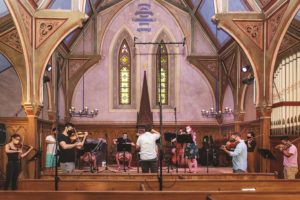Samuel Barber’s Adagio for Strings is a warhorse — a piece of classical music that is played so repeatedly, it ought to get old. But it doesn’t.
Partly because of its minor key and heartbreaking harmonies, Barber’s Adagio has become associated with mourning. It was played after John F. Kennedy’s assassination and after 9/11. It was the tragic theme to the Vietnam War movie Platoon. Quite a few orchestras are playing it during the pandemic. Back in May, the Berlin Philharmonic performed it in an empty concert hall, streamed online.
The piece was originally composed as the slow movement of a string quartet, but Barber arranged it for string orchestra. Arturo Toscanini conducted its 1938 premiere with the NBC Symphony Orchestra, broadcast on the radio. This was at the tail end of the Great Depression, just before World War II.
Barber’s Adagio is a highlight of the Cape Cod Chamber Orchestra’s virtual concert, “Spatial Sonorities,” streaming this Friday. The other pieces on the program are Mozart’s Divertimento in F, William Grant Still’s Mother & Child, and Peter Warlock’s Capriol Suite.
Because the concert was pre-recorded, it is possible to review it before it streams, a bit like time traveling. It was filmed in the historic Yarmouth New Church from a few different camera angles, and the editing uses some slow zooms. In this way, your “seats” are chosen for you, as well as who you choose to look at. Unfortunately, that affects your perception of the performance.
Because of Covid guidelines, there are a limited number of musicians playing. The effect sounds more like chamber music, which makes sense, considering the Adagio’s origins. Though this setup is usually a challenge for intonation, this orchestra has no problem.

The piece begins with a piercing B-flat in the first violins. The remainder of the orchestra joins in, creating a suspension. The melody in the first violins rises and circles back on itself, like a person pacing. Conductor Matthew Scinto avoids the temptation to take a tempo that is too slow or plodding.
Each time the orchestra comes together on a warm, expansive chord, it is gorgeous. When principal viola Celia Daggy gets the melody, she really shines, especially on her carefully placed portato notes.
The melody is passed to the cellists, Timothy Paek and Joseph Gotoff, and it rises into their higher register. They play a beautiful slide that sounds like a wail. If only the camera settled on them at this moment.
At the climax, all the musicians, except the poor bass player, who is left out, have risen to the highest registers of their instruments. The effect is a piercing, silvery chord. Scinto really milks it, perhaps too much. It is a tad too long, with too much vibrato. But it works in this context, because the silence that follows sounds even louder because of it.
You can really hear the room, the cavernous sonority of the church. In a virtual setting, that is some feat. And with the musicians’ bows still in the air, there is no risk of the audience mistaking the piece to be over and ruining the silence with clapping — something that happens all too often.
The rest of the piece, with its cautious starts and stops, functions as a cool down from this climax. It ends on a quiet and solemn chord, once restated.
Before you listen to this beautiful performance, a few suggestions. Use headphones, or, better yet, a good speaker. Choose a comfortable volume, and stick with it. Even though the Adagio has some dynamic extremes, resist the urge to adjust. And listen straight through; try not to pause —that email or text message can wait. Maybe even turn out the lights and let it wash over you.
Divine Night of Strings
The event: “Spatial Sonorities,” a virtual concert by the Cape Cod Chamber Orchestra
The time: Friday, Oct. 2, at 7 p.m.
The place: Streaming at capecodchamberorchestra.org; recorded at Yarmouth New Church
The cost: Free, but $20 virtual tickets are suggested



